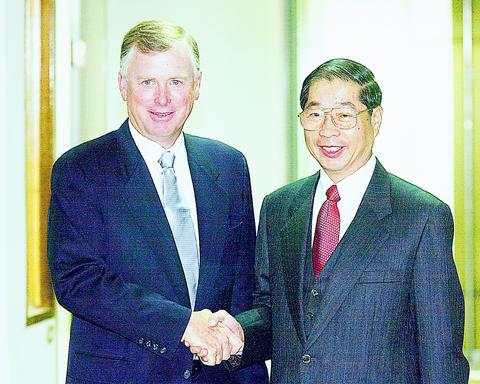Exploring business opportunities in Taiwan, former US vice president Dan Quayle yesterday met banker-turned-Minister of Finance Lee Yung-san (李庸三) to lobby for the establishment of an asset management company (AMC) by Cerberus Capital Management.
"Cerberus, which has made investments in South Korea and Thailand, is evaluating Taiwan's market," Lee told reporters after a 30-minute closed-door meeting with Quayle yesterday.
As a Cerberus consultant, yesterday was the second time that Quayle officially exchanged views with local authorities. He last met with former finance minister Yen Ching-chang (

PHOTO: FANG PIN-CHAO, TAIPEI TIMES
Quayle was accompanied by Jaideep Krishnna, managing director of Cerberus Asia Ltd.
Knowing that Lee previously worked in Taiwan's banking sector, Quayle came looking for the minister's recommendations for partnerships, Lee said. Cerberus hasn't made any final decisions on local partners yet, he said.
The AMC plan, which was initiated under the previous KMT government, was advocated by the incumbent DPP government as an effective way to auction off impaired bank assets. However, after more than one year, the plan has stalled.
"Because of a lack of capital, many banks have decided to seek special project companies to help clean up their bad loans," said Wang Heh-song (王鶴松), senior vice president and chief economist at the International Commercial Bank of China (ICBC, 中國商銀).
Special project companies circumvent capital requirements by acting as a broker that sells off bad assets for a commission.
He said that the strategy has been adopted by the Taiwan Asset Management Co (台灣金融資產管理公司), which began operating last November, and Hua Nan Commercial Bank (華南銀行), which signed a memorandum of understanding with Lehman Brothers on forming an AMC. The Overseas Chinese Bank (華僑銀行), which will partner with GE Capital, also used the strategy.
In addition, joint venture between Chinatrust Commercial Bank (中國信託銀行) and Goldman Sachs, and another between China Development Industrial Bank (中華開發銀行) and Texas-based Lone Star Group, may soon enter the fray.
"An orderly and gradual approach is necessary to make sure the local property market won't be too negatively impacted after AMCs are set up to auction off impaired assets at prices 30 to 40 percent below market value," Wang said.
Wang, however, said that he was upbeat about the plan's feasibility since the nation has as much as NT$1.64 trillion in bad loans, which he said will take more than 10 years to clean up.
"The banking sector should be happy if NT$100 billion in bad loans can be written off annually," he said.
While Wang endorsed foreign AMC expertise in Taiwan, Wang Wen-yu (
"Foreign players have been urging the government to modify regulations that will allow them to auction off impaired assets more effectively, and with a lower cost and a higher return in accordance with the market mechanism," Wang said.
"The burden would then be on shoulders of local players to comply with government policies in handling state-owned banks' non-performing loans."

CHIP RACE: Three years of overbroad export controls drove foreign competitors to pursue their own AI chips, and ‘cost US taxpayers billions of dollars,’ Nvidia said China has figured out the US strategy for allowing it to buy Nvidia Corp’s H200s and is rejecting the artificial intelligence (AI) chip in favor of domestically developed semiconductors, White House AI adviser David Sacks said, citing news reports. US President Donald Trump on Monday said that he would allow shipments of Nvidia’s H200 chips to China, part of an administration effort backed by Sacks to challenge Chinese tech champions such as Huawei Technologies Co (華為) by bringing US competition to their home market. On Friday, Sacks signaled that he was uncertain about whether that approach would work. “They’re rejecting our chips,” Sacks

NATIONAL SECURITY: Intel’s testing of ACM tools despite US government control ‘highlights egregious gaps in US technology protection policies,’ a former official said Chipmaker Intel Corp has tested chipmaking tools this year from a toolmaker with deep roots in China and two overseas units that were targeted by US sanctions, according to two sources with direct knowledge of the matter. Intel, which fended off calls for its CEO’s resignation from US President Donald Trump in August over his alleged ties to China, got the tools from ACM Research Inc, a Fremont, California-based producer of chipmaking equipment. Two of ACM’s units, based in Shanghai and South Korea, were among a number of firms barred last year from receiving US technology over claims they have

It is challenging to build infrastructure in much of Europe. Constrained budgets and polarized politics tend to undermine long-term projects, forcing officials to react to emergencies rather than plan for the future. Not in Austria. Today, the country is to officially open its Koralmbahn tunnel, the 5.9 billion euro (US$6.9 billion) centerpiece of a groundbreaking new railway that will eventually run from Poland’s Baltic coast to the Adriatic Sea, transforming travel within Austria and positioning the Alpine nation at the forefront of logistics in Europe. “It is Austria’s biggest socio-economic experiment in over a century,” said Eric Kirschner, an economist at Graz-based Joanneum

OPTION: Uber said it could provide higher pay for batch trips, if incentives for batching is not removed entirely, as the latter would force it to pass on the costs to consumers Uber Technologies Inc yesterday warned that proposed restrictions on batching orders and minimum wages could prompt a NT$20 delivery fee increase in Taiwan, as lower efficiency would drive up costs. Uber CEO Dara Khosrowshahi made the remarks yesterday during his visit to Taiwan. He is on a multileg trip to the region, which includes stops in South Korea and Japan. His visit coincided the release last month of the Ministry of Labor’s draft bill on the delivery sector, which aims to safeguard delivery workers’ rights and improve their welfare. The ministry set the minimum pay for local food delivery drivers at